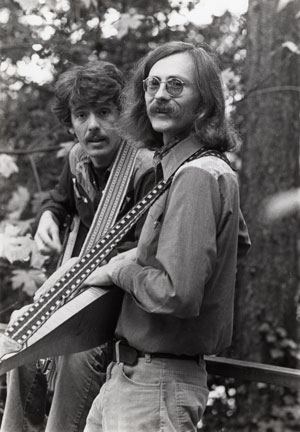Return to KRAB Audio Archives main menu
The KRAB Audio Archive
Bluegrass to KRABgrass
American traditional, Folk, Fiddle, Banjo, Old Timey, Country
Program guide Number 1 Feb 1963 has The Folk Blues drawn from Mrs G Wallace (Kay) Umphry's collection of 78's, and Scots Folk Music from the University of British Columbia; In Spring 1963 a biweekly Live Folk Song Concert is hosted Sunday nights by Judy Buck; KPFA sends up tapes of Rolf Kahn hosting a series in 1964; Mike Russo and Roger Wheeler appear live in the KRAB studio Aug 1964; Bluegrass sprouts in 1964, nurtured by Ron Ginther, with a program every other week, becoming monthly in 1965. In February of 1966 he turns the turntables over to Dave Wertz, who creates great havoc with his collection of stories and double entendre. "Laughin' Dave" resumes the every other week schedule. Oct 1967 Linda and Leonard Good run Folk Music: "a mishmash of anything from anywhere". For a few weeks in Jun 1968 Dave goes on vacation, so Ramblin' Charlie Green, Vivian and Phil Williams take a turn at it. Dave comes back and the Tall Timber Boys move to another night. He is joined in July by straight man Jim Conrad. The Country Victrola starts alternating with Tall Timber on Thursday nights. At some point Dave started calling it "mountain music", and someone called him the Prime minister of the Funk Republic. And then on December 24, 1968 somebody named Tiny Freeman, with hands and fingers that seemed out of proportion to the "tiny" knobs and switches of the controls, wearing a locomotive engineer's cap and carrying enough beer to swamp a gut bucket, gets behind the board with a flat bed full of bluegrass and banjos. Until Fall of 1969 Wertz and Freeman alternate, then the show with Freeman moves to Saturday afternoon, a little early in the day for a hard partier. In 1970 Tiny seeks his fortune in California via tug boating, so Phil Williams and the Folklore Society take another crack at it. But he's back in April with food-stomping and lip-smacking. In August the show is moved to 11:00pm Saturday night. Did I say it is weekly now? May 1971 it moves to 10:00pm. July 1973, Tiny leaves, and the Peanut Special rolls in with Mike Toennessen conducting at 9:00pm still on Saturday where it will remain for the next 12 years. It is late 1974 and phone lines are run down to the Inside Passage in Pioneer Square which is just beginning to be wired for electricity. Every week there is a live show from the Passage. It could be Willow Creek Ramblers, Tall Timber, or Entropy Service. Sometime in 1975 the lawn turned blue and walked sideways - The Saturday fiddle and banjo show started being called Bluegrass and KRABgrass. If it is KRABgrass, it must be Dennis Flannigan. As if Flannigan's show wasn't enough, in 1976 there was also Thane Mitchell and Bill Scott with TrueGrass and a Folk Show Tuesday nights with a host of hosts; Margo Murphy Jun 1977 The Folk Show, Charlie Sharpe Jun 1977 The Folk Show, Neil Strassman Jun 1979 KRABgrass, Frank Davidson, Aug 1979 Folk Show, Eric Hummel Aug 1979 does KRABgrass, Tiny returns May 1982 returns and subs for Flannigan, Phil Andrus Jun 1973 American Folk Music, Paul Roepke Dec 1979, Kevin Saunders May 1980, Bob LaClair Sep 1979, Jamie Hix Jul 1980, Kathy Cody does KRABgrass Country for a marathon Oct 1980, Bill Pierce Mar 1983, Bryan Johnson Jun 1983, Shirley Oberg Feb 1984.....
You may also find these other pages of interest: |
|
|
|
Finger-picked Guitar Folk and Blues, Roger Perkins and Nancy Keith live at KRAB - KRAB Apr 12, 1963
 One of the earliest surviving programs, recorded and aired just five months after KRAB went on the air. Here are Roger Perkins and Nancy Keith with Pooh song, Cock Robin, Duncan and Brady, Coney Island Washboard, and four more.
One of the earliest surviving programs, recorded and aired just five months after KRAB went on the air. Here are Roger Perkins and Nancy Keith with Pooh song, Cock Robin, Duncan and Brady, Coney Island Washboard, and four more.
![]() Listen now - Finger-picked Guitar Folk and Blues (23:12)
Listen now - Finger-picked Guitar Folk and Blues (23:12)
Recording courtesy of the Jack Straw Foundation, JSF M0222
Mike Russo and Ron Brentano in Concert - Rec Apr 13, 1963; KRAB Summer 1963
From 1963, here are Mike Russo on 12 string guitar and piano, and Ron Brentano on banjo. KRAB recorded their concert at Eagleson Hall in the U District, and aired it sometime later. Exactly when, we do not know, as most of the program guides from 1963 and 1964 have not yet been found. Eagleson Hall (1417 NE 42nd) was built and and owned by the YMCA until 1964, when it was purchased by the University of Washington. For more about Eagleson Hall see HistoryLink.

In the early days of KRAB, Russo was a relatively frequent guest, and participated in the 1967 Downhome Blues Party with Lightnin' Hopkins at Washington Hall Oct 21, 1967, cosponsored by the Seattle Folklore Society and KRAB. The program guide listing above is from guide number 43, Aug 1964.
![]() Listen now - Mike Russo and Ron Brentano in Concert - Rec Apr 13, 1963; KRAB Summer 1963 (97:44)
Listen now - Mike Russo and Ron Brentano in Concert - Rec Apr 13, 1963; KRAB Summer 1963 (97:44)
Recording courtesy of Linda and Leonard Good, LG0012
KRAB's First Bluegrass Program, with Ron Ginther - KRAB Jul 1, 1964
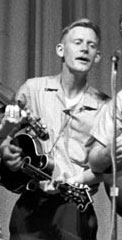 If I am following the chronology correctly, in Phil Williams's "Early Bluegrass in Western Wa and the PNW", Phil, Vivian, and Mike Nelson first encountered Ron Ginther, playing with John and Sally Ashford, as "The Cascades" at an open mike in a club in the basement at the corner of First Ave and Yesler Way during the 1962 Seattle World's Fair. Ron saw Phil holding a banjo and asked him if he played "hillbilly" music, and if he could join them. They played a set, and were immediately hired to perform Friday and Saturday nights at the "Place Next Door" adjacent to the Guild 45th Theatre. This was the birth of the "Turkey Pluckers".
If I am following the chronology correctly, in Phil Williams's "Early Bluegrass in Western Wa and the PNW", Phil, Vivian, and Mike Nelson first encountered Ron Ginther, playing with John and Sally Ashford, as "The Cascades" at an open mike in a club in the basement at the corner of First Ave and Yesler Way during the 1962 Seattle World's Fair. Ron saw Phil holding a banjo and asked him if he played "hillbilly" music, and if he could join them. They played a set, and were immediately hired to perform Friday and Saturday nights at the "Place Next Door" adjacent to the Guild 45th Theatre. This was the birth of the "Turkey Pluckers".
Recently Vivian Williams wrote that "Ron was and still is" something of an activist, "participating in demonstrations and writing various manifestos". Some of which one might attribute to him being a son of Ronald Debs Ginther, an artist known for depicting the plight of the poor and efforts of workers to organize in the 1930's.
Ron, and his brother Fred, are also heard in a KRAB program produced in 1975, US Labor Movement in Story and Song.
With most program guides of 1963 through 1965 missing from our collection, we cannot say for sure when bluegrass was first heard on KRAB, but are pretty certain the first regular bi-weekly broadcast started Jul 1, 1964.
 Here Program Director Nancy Keith introduces Ron Ginther, and they struggle with an uncooperative tape deck.
Here Program Director Nancy Keith introduces Ron Ginther, and they struggle with an uncooperative tape deck.
![]() KRAB's First Bluegrass Program, with Ron Ginther - KRAB Jul 1, 1964 (26:52)
KRAB's First Bluegrass Program, with Ron Ginther - KRAB Jul 1, 1964 (26:52)
Recording courtesy Linda and Leonard Good, LG0002; Photo of Ron Ginther found on "Early Bluegrass in Western Washington and the Pacific Northwest, A personal account by Phil Williams"
Bluegrass Freakout with Virginia Slim - KRAB 1965 or 1966 or 1967
Although the tape and its box provide little information about this program, the KRAB Archive Special Consultant in Traditional Music and Musicians of the Pacific Northwest, Vivian Williams, has shared some exciting details:
Yup, I absolutely recognize the voice, "Virginia Slim" is Ron Hyde. "Virginia Slim" was an alter ego that he occasionally donned for satirical purposes.
Ron Hyde moved to Chesaw, Washington (up by the Canadian border not far from Tonasket) many years ago, and made mandolins in his workshop. There are several videos of him on YouTube; the latest was made in 2017 so he's probably still around.
You might notice that they mentioned that Phil Poth and Ron Hyde were making F5 style mandolins in a workshop on Alder Street; that was Ron's house. Ron was a pretty good mandolin player, and he might be playing mandolin on some of the "pickup band" numbers, although those may be Phil Poth. At the end we were switching instruments around like crazy, so it's pretty hard to tell who's doing what.
The original "Krapp Family," mentioned near the end, was a tape that Phil W. and Peter Langston and I made ca. 1963, playing several overdone folk-scare standards incompetently on various weird instruments (toy glockenspiel, banjo-uke, & others), which I guess we were more or less reviving at the show by playing instruments other than our usual ones. Hey, my banjo playing wasn't all of that bad! But Phil on the dobro, I dunno ..... And that's me giggling obnoxiously in the background throughout the last part of the show.
A little more about Ron Hyde can be found here.
[Editor's note: Before we receved Vivian's comments, about all that could be said was Mac Wiseman (supposedly), George Henmar from Waukegan, Phil Poth, and Maynard Peterson are the "pickup band hanging out around the station" and making life difficult for Virginia "Verge" Slim, until Phil and Vivian Williams show up with Dick Gordon in tow. At least that's what it sounds like though it is to difficult to separate whom is actually there from the hallucinations.]
Phil Poth passed away May 5, 2008.
![]() Bluegrass Freakout with Virginia Slim - KRAB 1965 or 1966 or 1967 (57:20)
Bluegrass Freakout with Virginia Slim - KRAB 1965 or 1966 or 1967 (57:20)

Recording courtesy Linda and Leonard Good, LG0024
Bluegrass with Dave Wertz - Grand Old Uproar - KRAB Jan 30, 1968
"Dave Wertz KRAB Filter King
jives."
The first bluegrass programmer on KRAB was Ron Ginther. "Uncle" Dave Wertz was the second. Tonight his wench is out of town, so its an opportunity for the groupies, and an excuse for Dave to tell a joke.
Dave Wertz' Bluegrass show is named in the FCC's complaint against KRAB that resulted in the hearing of 1970: "Dave Wertz describes himself as an amateur expert on bluegrass music. He had a program on KRAB which consisted of bluegrass music and pertinent accompanying commentary. Wertz tried to imitate the style of such well known programs of bluegrass as Nashville's Grand Ole Opry and Richmond's Old Dominion Barn Dance. Between broadcasts of music selections, Dave Wertz would tell what he called "corn country jokes".
"When Wertz came to work for KRAB it was made clear to him that he was not to use any obscenity on the air. His type of joke does not contemplate the use of obscene words. He had no recollection of what he may have said on his broadcast of October 1968, but he had been told that someone had called to complain about the program. He may have told a few of his country stories. An example which he gave is the one about "the hillbilly whose bathroom caught on fire but, fortunately the flames didn't reach the house."
Program guide 222, Jan 1972, with a photo of Dave Wertz, has the following:
We have no intention of writing a eulogy to Dave Wertz. Not because he doesn't deserve one, but perhaps because it's the kind of thing he would have detested. He was simple, and direct, and the kind of maudlin sentiment attached to death would have seemed pointless to him.
Let us just say that one of the best friends we ever had is gone, and we'll miss him.
Is there anyone out there that remembers Dave and can share a memory?
![]() Listen now - Bluegrass with Dave Wertz - Grand Old Uproar - KRAB Jan 30, 1968 (47:36)
Listen now - Bluegrass with Dave Wertz - Grand Old Uproar - KRAB Jan 30, 1968 (47:36)
Recording courtesy of the Jack Straw Foundation, JSF M1574
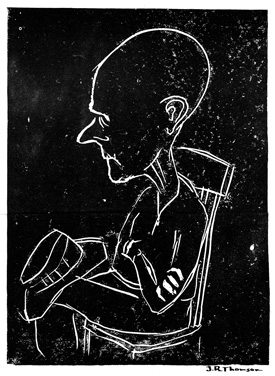 A KRAB Hootenanny - KRAB 1969 to 1970
A KRAB Hootenanny - KRAB 1969 to 1970
"Folk" music, traditional or revival, American or world, live or recorded, was part of the KRAB repertoire from the start. One of the earliest shows was started in February 1963 with Judy Buck hosting live concerts in the studio every Sunday evening featuring performers from as far away as Portland and Vancouver. So far, no tapes of those broadcasts have been located.
In 1969 Greg Palmer was a KRAB volunteer producing the Sunday Show while attending the University of Washington. In the Drama School he encountered one Jeffrey R Thomson, AKA "Magic Fingers", another student of theatre. Jeff was also a musician, playing a 12-string guitar and singing everything from "Plastic Jesus" to "Cocaine", as well as his own compositions. And, he was a visual artist responsible for several program guide covers. On at least four occasions Greg persuaded "Magic Fingers" to perform live on KRAB and take requests from the audience.
We have six tapes. The labels are a little unclear, but the program guides do give us some description. With the exception of Tape, 6, which was recorded in Laramie, Wyoming for broadcast during a fund raising marathon, Jeff is joined by Greg in the closest thing we have found to a KRAB hootenanny.
Tape 1 - The first tape seems to have been recorded during a two day fund raising marathon Saturday and Sunday, the 29th and 30th of March 1969 (32:50)
Tape 2 - Sunday, Aug 17, 1969, 11:30 pm (It is unclear why this tape starts with the voice of Michael Wiater introducing his program "Toothpick, Lisbon, and the Orcas Islands". Michael, where are you?) (33:14)
THE ROACHDALE REPORT - Featuring the triumphant return of Magic Fingers to Seattle. Yes, fans, about six months ago, an unscheduled after-hours show took place, featuring the phenomenal 12 string guitar playing of Magic Fingers, plus the exciting throbs of his magic Throat. The next day M.F. left for Wyoming, but now he's back! He'll be taking requests for all your favorites and playing his own compositions.
Tape 3 and 4 - Sunday, Aug 31, 1969, 11:30 pm (68:17 and 40:58)
THE ROACHDALE REPORT - Produced by the Roachdale Radio Network for export to all Universal Life Ministers. Tonight, a farewell party for Magic Fingers, who is ending his all-too-brief stay in Seattle to return to the wilds of Wyoming.
Tape 5 - Wednesday, Jan 28, 1970, 11:00 pm (18:46)
MAGIC FINGERS IS BACK AGAIN - That's right, kids! If KUOW can bring back Big Jon & Sparky, KRAB can masticate the air waves with that snappy kid from Wyoming, Magic Fingers, playing his 12 string just like Glen Campbell used to do and warbling his way into your heart. Requests will be taken (LA2-1111) for all your blues and folk favorites.
Tape 6 - Wednesday, May 20, 1970, 9:30 pm (29:17)
THE MAGIC FINGERS MARATHON MUSICOTHON - Over the past two years Jeffrey R. 'Magic Fingers' Thomson has appeared on four late-night, folk-blues-other live music requestothons, playing his twelve string guitar and warbling as only he can do. Tonight's effort is, unfortunately, not live, as M.F. is in Laramie, Wyoming, bringing the magic of set design to the cowboys. However, he made this tape there a few weeks ago, singing some Leadbelly, some Simon, and some vintage Fingers. Mag (we call him Mag) is joined, occasionally, by Cathy Fermilia, John ' Lightning Digits' Sundahl, Steve Jacobson, and the Singing Mayonaise.
You can listen to the individual tapes or play as a continuous stream.
![]() Listen now - Magic Fingers Marathon (3:43:22)
Listen now - Magic Fingers Marathon (3:43:22)
Recordings courtesy Jeffrey R Thomson and Cathy Palmer
Old Time Music with John Burke - KRAB 1971 - 1973
Tuesday nights at 8:00 John Burke alternated with Phil Williams, playing and talking about things musical and old timey. Here are two shows, probably from 1971 when the program was preceded by William Mandel's Soviet Press and Periodicals.
Anyone know what has become of John Burke?
![]() Listen now - Old Time Music with John Burke - 2 Programs approx 60 minutes each (2:17:40)
Listen now - Old Time Music with John Burke - 2 Programs approx 60 minutes each (2:17:40)
Recording from the collection of Dennis Flannigan, DF0251

The Peanut Special, hosted by Mike Toennessen - Apr 13, 1974
Bluegrass and the picket line. Tonight, Mike talks about the Seattle City Light strike, and he is joined by guest Thane Mitchell playing and talking about the bluegrass.
![]() Listen now - The Peanut Special (1:00:37)
Listen now - The Peanut Special (1:00:37)
Cassette recording courtesy of Dennis Flannigan, DF1005
Live from the Inside Passage - Willow Creek Ramblers with KRAB's first show from the Inside Passage - KRAB Sep 6, 1974
Live Music From the Inside Passage. Bluegrass, live from Pioneer Square.
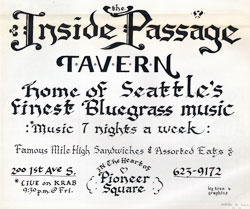
Advertisment in KRAB program guide
In the Fall of 1974, shortly after the success of the first broadcast of the NW Regional Folklife Festival, KRAB staff decided to venture into the world of live shows from local music venues. The first was from the Inside Passage tavern, First and Washington in Pioneer Square, Friday’s 8:30 to 9:30. “Are we on?” “The band is getting ready and will be here in a moment”. Tiny Freeman can be heard in the audience. Leila Gorbman announces from the Passage.
 Tonight, the Willow Creek Ramblers are Phil Poth, 5-string banjo; Paul Gillingham, Guitar; Dr Brian Hughes from Indiana, mandolin; and Jim Beatty, bass.
Tonight, the Willow Creek Ramblers are Phil Poth, 5-string banjo; Paul Gillingham, Guitar; Dr Brian Hughes from Indiana, mandolin; and Jim Beatty, bass.
![]() Listen now - Live from the Inside Passage - The Willow Creek Ramblers - KRAB Sep 6, 1974 (41:58)
Listen now - Live from the Inside Passage - The Willow Creek Ramblers - KRAB Sep 6, 1974 (41:58)
Recording courtesy Dennis Flannigan, DF1043
Entropy Service at the Inside Passage and on Tour - 1974-1975
There can be many obstacles that get in the way of telling an accurate story. Sometimes, even when documentation is contemporaneous with the events, people hear things differently or it is difficult to read what has been written or . . . . who knows? So it is always helpful when we hear from someone who was there, knew the people, remembers, and can reference details. In this case we received an email from Peter Langston, and he has straightened us out on a number of misstatements in our earlier post of these recordings. Song titles, places, and performers have been corrected below.
Looking at photographs and posters on the Entropy Service web site, the core of Entropy Service was Peter Langston, Linda Waterfall, and J. B. White, though on some occasions they were joined by Judy Cook or Sharyle Patton. Linda Waterfall passed away in January 2019. Paul de Barros wrote about her in the Seattle Times.
Selections of Entropy Service at the Inside Passage Tavern (First and Washington in Pioneer Square), early 1974. Performed by Peter Langston, Linda Waterfall, and J. B. White
Songs to Myself
Ain’t no Sweet man that’s worth the salt of my tears
Temptation Rag
Highland Road
Mother Night (w/echo)
Dairy Man Blues
Over the Mountain
Ewe, Ewe, Ewe
![]() Listen now - Entropy Service recorded at the Inside Passage - 1974 (29:06)
Listen now - Entropy Service recorded at the Inside Passage - 1974 (29:06)
Selections of Entropy Service on tour - Recorded at either the Cantab Lounge in Cambridge, Mass or at Jeremiah's Restaurant in Allston, Mass, in early 1975. Personnel: Peter Langston, Linda Waterfall, J. B. White, & Sharyle Patton
The Bird Song
When I take my Sugar to Tea
Lovesick Blues
Cherry Tomato
Elizabeth
Fiddler a Dram
Songs to Myself
Smoke! Smoke! Smoke!
![]() Listen now - Selections of Entropy Service recorded on tour - 1975 (30:02)
Listen now - Selections of Entropy Service recorded on tour - 1975 (30:02)
Recordings courtesy Bruce Kirkman and Robert Weppner, RW0001 and RW0002
Live from the Inside Passage - Willow Creek Ramblers and The Old Hat Band - KRAB Nov 1 and 8, 1974
The Willow Creek Ramblers and the Tall Timber String Band alternated on Friday nights at the Passage
Tonight, the Willow Creek Ramblers are Phil Poth, banjo; Don McAllister, mandolin; and Paul Gillingham, guitar and emcee. On Nov 1st Willow Creek had technical difficulties, which eventually were fixed by Phil Williams throwing a switch. Oh well. At the end of the performance. Leila speaks briefly with Phil Poth.
The Nov 8 performance by The Old Hat Band was the broadcast portion of a longer bluegrass festival at The Passage that evening.
Announcing for KRAB is Leila Gorbman. KRAB technical support was Ken Heller. Where is he now?
![]() Listen now - Live from the Inside Passage - The Willow Creek Ramblers - KRAB Nov 1, 1974
Listen now - Live from the Inside Passage - The Willow Creek Ramblers - KRAB Nov 1, 1974
![]() Listen now - Live from the Inside Passage - The Old Hat Band - KRAB Nov 8, 1974
Listen now - Live from the Inside Passage - The Old Hat Band - KRAB Nov 8, 1974
See also Entropy Service Live at the Inside Passage
Recording courtesy Dennis Flannigan, DF1007

Country Fiddling with Frank Ferrel talking with Mark and Michelle O'Connor - KRAB May 19, 1975
 Frank Ferrel's program, "Country Fiddling", eventually became "Fiddling KRAB". Here he talks with National Junior Champion old time fiddler Mark O'Connor (then 14) and his 10-year-old sister Michelle, who play's mandolin. They are joined by Hank English on guitar, and Nell Carter editor of the Old Time Fiddler association newsletter. Mark reveals his secret for winning, and Frank persuades him to play some guitar.
Frank Ferrel's program, "Country Fiddling", eventually became "Fiddling KRAB". Here he talks with National Junior Champion old time fiddler Mark O'Connor (then 14) and his 10-year-old sister Michelle, who play's mandolin. They are joined by Hank English on guitar, and Nell Carter editor of the Old Time Fiddler association newsletter. Mark reveals his secret for winning, and Frank persuades him to play some guitar.
Begins mid-sentence and ends abruptly.
Recording courtesy Dennis Flannigan, DF1017

|
Dulcimer Deathwatch – Robert Force and Albert D'ossché - Live at KRAB, May 24, 1975
In 1975, among other things, I was producing a late night variety show – mostly recorded music and readings, occasional interviews of people with strange stories, and, rarely, something special. On the Saturday of the Memorial Day weekend, a little after midnight, after a day of playing at the NW Regional Folklife Festival, Robert Force, Albert D'ossché, Jake Bell, and Mark Weinberg arrived at the KRAB studio, where they played and improvised for the next couple of hours.
Robert and Albert wrote the book about dulcimer, In Search of the Wild Dulcimer. In addition to dulcimer it seemed as if they could play any instrument they got a hold of: doumbek, piano, trombone, or kazoo. It sometimes was unclear when the music stopped and the impromptu comedy started – it just kept coming. Albert, in Robert’s words, “departed the planet” in 1990. Although Robert went on to other things, he continues to perform and teach dulcimer.
Robert Force, dulcimer and vocals; Albert D'ossché, dulcimer and vocals; Jake Bell, guitar; Mark Weinberg, banjo and vocals
![]() Listen now - Force, D'ossche, Bell and Weinberg (1:29:22)
Listen now - Force, D'ossche, Bell and Weinberg (1:29:22)
Recording collection of C Reinsch
The Turkey LIfter Marathon - A Night of Live Bluegrass Hosted by the Three Phils: Andrus, Williams and Bannon - KRAB Nov 10, 1975
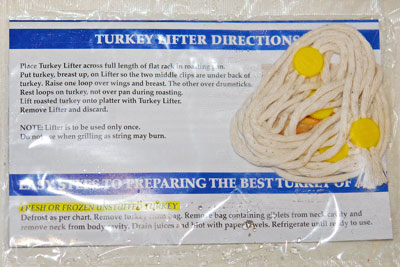
The Corporation for Public Broadcasting has sunk the hook deep in the KRAB's throat, and KRAB is trying to raise $75,000 in non-federal funds in order to qualify for a $19,000 grant. This is the first day of a marathon drive that went to the end of the month. By 1975 CPB and PBS stations had trained their listeners to expect rewards for contributing in the form of CDs, cookbooks, and trips to the Bahamas. KRAB volunteers did their best to find premiums that KRAB subscribers might appreciate, and that KRAB could afford. It being the month that Americans consumed turkey, someone found a case of Turkey Lifters, and they were offered to anyone that subscribed. I think they looked something like the one pictured above.
Meanwhile, in the music studio the heat has been tuned on to deter frostbitten fingers, but with the result that the musicians are tuning to the progressively further out-of-tune-piano. Phil Williams offers a subscription (and a turkey lifter) to any piano tuner willing to come in to the cold. If there was a program guide for Nov 10 through the 30th of 1975, it has not been found. Phil Williams talks about a schedule that lists a "Bluegrass Ensemble", but there is no sign of it.
Part 1: Larry Hanks; Phil Williams announcing and mandolin; Barbara Lamb; Hank Bradley; Vivian Williams
Part 2: Vivian Williams; Phil Williams does a pitch; Hank Bradley; Twin Fiddles - Vivian Williams and Barbara Lamb; Earl Bradley, banjo; Darrel McMichael(?), bass; Stuart, whistle; Red Herick, mandolin; Vivian and Barbara, fiddles; and ?; Bob and Carol Waller
Part 3: Larry Hanks; Jeff Thorne; Dick Gordon of Rag Daddy visits for the last song; Break for Chinese Radio Hour; KRABgrass with Phil Andrus in the out-of-control-room; Mountain County Co-op
Part 4: More Mountain County Co-op; Phil Andrus doing the KRABgrass
Recording courtesy Dennis Flannigan, DF1016

Albert D'ossché and Jake Bell with a Bicentennial performance - KRAB Live Jul 4, 1976
Albert and Jake, playing with dulcimer, guitar, kazoo, doumbek, kalimba, and politically irreverent imaginations.
![]() Listen now - The Bicentennial Deathwatch - Jul 4, 1976 (35:24)
Listen now - The Bicentennial Deathwatch - Jul 4, 1976 (35:24)
Recording collection of C Reinsch
Okie Doke String Band Live on Patchwork - KRAB Apr 9, 1977
Yet another another fund raising marathon (Apr 1 to 10, 1977) and Okie Doke comes in to play and raise some money. The players are Marc Bristol, guitar; Quentin Rhoton, washtub bass; and Dan Kersten, mandolin. The following week, on Apr 16, they were appearing at the Big Hat Ball in Carnation's Odd Fellows Hall.
We (Marc first, me second) think this recording is actually from two appearances on Patchwork, the first during the pledge drive marathon on Apr 9, and the second on the Saturday (May 28) evening before they were scheduled to play at the 1977 Folklife Festival. On May 21, Marc got a big spread in the Seattle Times (click here to read it).
The program producer formerly known as "Patchman" can be heard at 41:25 and again at 48:56.
![]() Listen now - Okie Doke String Band Live on Patchwork - KRAB Apr 9, 1977 (74:00)
Listen now - Okie Doke String Band Live on Patchwork - KRAB Apr 9, 1977 (74:00)
Recording courtesy Marc Bristol
Late on a Wednesday Night in 1981......Moskowitz and Nearly Normal Neil - KRAB Feb 18, 1981
10:00 OTHER COUNTRY MUSIC
The Sons of the pioneers sing from saddle and sagebrush. Moskowitz presents classic and unusual music drawn from the diverse world of country music.
12:00 AFTER MIDNITE
Blues by Elmore James, "The Sky is Crying." But what color is the rain? blue, blue, blue the wiling chicago sound with neil normal.
Here are a couple of voices we haven't heard from yet. Known to his fans as Moskowitz, Bob Baron became known for the rare and peculiar, and comedic. According to Bill Virgin in an obituary for Baron (d. Aug 18, 2006) in the Seattle PI "His radio career started in earnest in this region in the mid-1970s at KRAB-FM, but he had stints at KMPS-FM, KRPM-FM, KKBY-FM and KYCW-AM. The Moskowitz name came from an artist's signature on a poster of a rabbit." In 2006 he had a show on KSER.
Nearly Normal Neil had a show on KRAB from 1980 until near the end, Apr 13, 1984.
![]() Listen now - Moskowitz and Nearly Normal Neil - KRAB Feb 18, 1981 (48:51)
Listen now - Moskowitz and Nearly Normal Neil - KRAB Feb 18, 1981 (48:51)
Recording courtesy of Paul Dorpat
If you possess any souvenirs (program guides, tapes, or photos) or have a story about your experience with KRAB you are willing to share, please email archive@krabarchive.com
